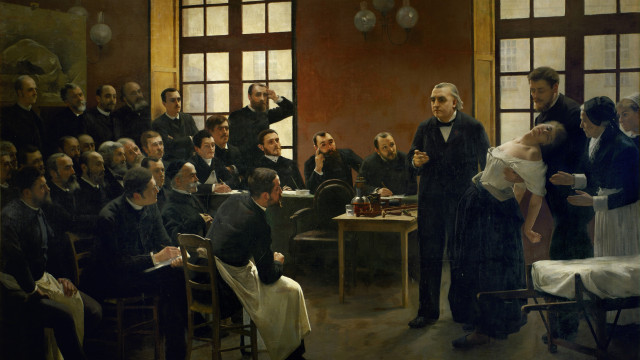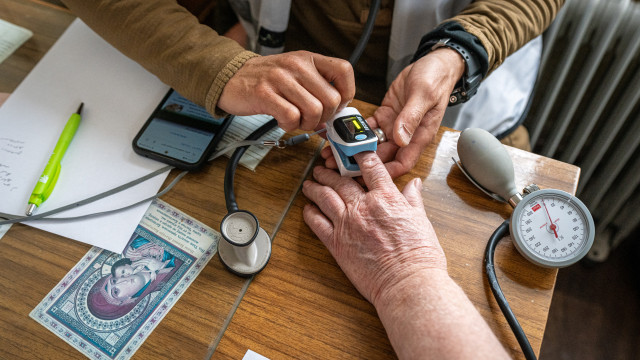





























See Also
See Again
© Shutterstock
0 / 30 Fotos
You’re stressed out or feeling anxious
- A bit of stress is normal and even beneficial, but too much of it can have an impact on your sleep. This is mostly due to the release of the stress hormone cortisol, which leaves you in a state of alertness.
© Shutterstock
1 / 30 Fotos
You’re stressed out or feeling anxious
- Cortisol is naturally released when you wake up, and indeed helps you become more alert. Though it’s not helpful when it’s time to hit the sack!
© Shutterstock
2 / 30 Fotos
You’re stressed out or feeling anxious
- Racing, intrusive thoughts, and uneasy feelings might take over your subconscious. Stress and anxiety can manifest in a more subtle way, but can indeed be the reason why you keep waking up in the middle of the night.
© Shutterstock
3 / 30 Fotos
It might be your gut bacteria
- An imbalance in your gastrointestinal microbiome can actually disturb your sleep. This is usually tied up with an excess of cortisol, which may affect your gut’s good bacteria.
© Shutterstock
4 / 30 Fotos
It might be your gut bacteria - An imbalanced microbiome will also struggle to break down tryptophan (an amino acid) into serotonin (a neurotransmitter), which can influence your sleep.
© Shutterstock
5 / 30 Fotos
It might be your gut bacteria
- If this is your case, taking probiotics may help improve gastrointestinal microbiome, and therefore the quality of your sleep.
© Shutterstock
6 / 30 Fotos
Your blood sugar levels might be to blame
- Your blood sugar levels fluctuate slightly throughout the day, but if they drop considerably when you go to bed, it can have an impact on your sleep.
© Shutterstock
7 / 30 Fotos
Your blood sugar levels might be to blame
- Low glucose levels during sleep may be caused by a number of factors, including diet. Low blood sugar will prompt your adrenal glands to release cortisol and consequently disturb the quality of your sleep.
© Shutterstock
8 / 30 Fotos
Your blood sugar levels might be to blame
- A balanced diet can go a long way when it comes to keeping blood sugar levels stable. A light pre-bed snack containing protein and fats (e.g. nuts) might also help keep blood sugar levels stable for longer.
© Shutterstock
9 / 30 Fotos
Drinking
- That glass of wine late in the evening might feel relaxing, but alcohol, especially when consumed within four hours of bedtime, can disturb your sleep.
© Getty Images
10 / 30 Fotos
Smoking
- Nicotine, regardless of how it’s consumed, can also make you wake up in the middle of the night. This is because nicotine is actually a stimulant, which is the opposite of what you need for a restful sleep.
© Shutterstock
11 / 30 Fotos
Good ol’ caffeine
- Many of us love coffee and other caffeinated drinks such as tea. But caffeine is a stimulant, and one you should steer away from ideally at least six hours before bedtime.
© Shutterstock
12 / 30 Fotos
It might be due to a nutrient deficiency
- Your body might need a nutrient that it is not getting. An example would be vitamin D. This vitamin is critical in the production of the sleep-regulating hormone melatonin.
© Shutterstock
13 / 30 Fotos
It might be due to a nutrient deficiency
- Some foods do contain vitamin D, but the best source is the sun. Sun exposure can help regulate your circadian rhythm, and prevent you from waking up in the middle of the night as often.
© Shutterstock
14 / 30 Fotos
It might be due to a nutrient deficiency
- Magnesium is another nutrient that can help you have a restful sleep. Magnesium is responsible for a number of processes, including increasing the levels of the neurotransmitter gamma-aminobutyric acid (GABA), which helps your body relax.
© Shutterstock
15 / 30 Fotos
Your hormones might be to blame
- A hormonal imbalance might keep waking you up in the middle of the night. Menopausal women, for instance, may experience hormonal fluctuations that affect sleep.
© Shutterstock
16 / 30 Fotos
Your hormones might be to blame
- A drop in progesterone levels, which is experienced during menstruation, can also affect sleep negatively.
© Shutterstock
17 / 30 Fotos
You might suffer from sleep apnea
- This condition causes you to stop breathing briefly during sleep, with pauses that can take up to 30 seconds. Sleep apnea can make you move around a lot during the night and wake you up.
© Shutterstock
18 / 30 Fotos
You might suffer from sleep apnea
- Sleep apnea not only is annoying and disturbs your sleep, but it’s also linked to a number of conditions, including cardiovascular problems.
© Shutterstock
19 / 30 Fotos
The reason might be nocturia
- Do you get up numerous times during the night to urinate? You might suffer from nocturia. Constant night trips to the bathroom can really affect the quality of your sleep.
© Shutterstock
20 / 30 Fotos
The reason might be nocturia
- Nocturia may be caused by a number of factors, namely an overactive bladder triggered by low levels of the hormone vasopressin, which is an antidiuretic. This can happen as we age.
© Shutterstock
21 / 30 Fotos
Prediabetes might be to blame
- There are other reasons that can urge you to go to the bathroom multiple times during the night. You may suffer from nocturnal hyperglycemia, which, unlike the dietary reasons mentioned previously, might be linked to diabetes.
© Shutterstock
22 / 30 Fotos
Prediabetes might be to blame
- If this urge to pee is accompanied by other symptoms, including irritability and headaches, it’s best to talk to your doctor about it. Restless leg syndrome might also be a sign of fluctuating blood sugar at night.
© Shutterstock
23 / 30 Fotos
Your liver function might be off
- Imbalances in liver function can have a big impact on your sleep. Your liver is responsible for metabolizing melatonin, which is key in the sleep-wake cycle.
© Shutterstock
24 / 30 Fotos
Your liver function might be off
- See your doctor if you have other symptoms such as itchy skin, loss of appetite, or tenderness around the liver area. Liver conditions should not be ignored.
© Shutterstock
25 / 30 Fotos
Your thyroid might be the culprit
- When your thyroid is overactive and produces a great quantity of hormones, also known as hyperthyroidism, you may feel a bit restless and irritable, which can keep you up at night.
© Shutterstock
26 / 30 Fotos
Your thyroid might be the culprit
- Though the opposite, hypothyroidism, can also have a negative impact on your sleep. An underactive thyroid can cause muscle and joint pain as well as make you more susceptible to anxiety.
© Shutterstock
27 / 30 Fotos
A change to your circadian rhythm
- The process that regulates our sleep–wake cycle can change. Jet lag, for instance, can have a huge impact on our sleep.
© Shutterstock
28 / 30 Fotos
A change to your circadian rhythm
- Shift work is another common circadian rhythm disruptor. Sources: (Health Digest) (Rise Science) (CDC) (CDEC) (Nutrients) (Yale Medicine) (Sleep Medicine Research) (Diabetes.co.uk) See also: How vitamin deficiencies impact sleep
© Shutterstock
29 / 30 Fotos
© Shutterstock
0 / 30 Fotos
You’re stressed out or feeling anxious
- A bit of stress is normal and even beneficial, but too much of it can have an impact on your sleep. This is mostly due to the release of the stress hormone cortisol, which leaves you in a state of alertness.
© Shutterstock
1 / 30 Fotos
You’re stressed out or feeling anxious
- Cortisol is naturally released when you wake up, and indeed helps you become more alert. Though it’s not helpful when it’s time to hit the sack!
© Shutterstock
2 / 30 Fotos
You’re stressed out or feeling anxious
- Racing, intrusive thoughts, and uneasy feelings might take over your subconscious. Stress and anxiety can manifest in a more subtle way, but can indeed be the reason why you keep waking up in the middle of the night.
© Shutterstock
3 / 30 Fotos
It might be your gut bacteria
- An imbalance in your gastrointestinal microbiome can actually disturb your sleep. This is usually tied up with an excess of cortisol, which may affect your gut’s good bacteria.
© Shutterstock
4 / 30 Fotos
It might be your gut bacteria - An imbalanced microbiome will also struggle to break down tryptophan (an amino acid) into serotonin (a neurotransmitter), which can influence your sleep.
© Shutterstock
5 / 30 Fotos
It might be your gut bacteria
- If this is your case, taking probiotics may help improve gastrointestinal microbiome, and therefore the quality of your sleep.
© Shutterstock
6 / 30 Fotos
Your blood sugar levels might be to blame
- Your blood sugar levels fluctuate slightly throughout the day, but if they drop considerably when you go to bed, it can have an impact on your sleep.
© Shutterstock
7 / 30 Fotos
Your blood sugar levels might be to blame
- Low glucose levels during sleep may be caused by a number of factors, including diet. Low blood sugar will prompt your adrenal glands to release cortisol and consequently disturb the quality of your sleep.
© Shutterstock
8 / 30 Fotos
Your blood sugar levels might be to blame
- A balanced diet can go a long way when it comes to keeping blood sugar levels stable. A light pre-bed snack containing protein and fats (e.g. nuts) might also help keep blood sugar levels stable for longer.
© Shutterstock
9 / 30 Fotos
Drinking
- That glass of wine late in the evening might feel relaxing, but alcohol, especially when consumed within four hours of bedtime, can disturb your sleep.
© Getty Images
10 / 30 Fotos
Smoking
- Nicotine, regardless of how it’s consumed, can also make you wake up in the middle of the night. This is because nicotine is actually a stimulant, which is the opposite of what you need for a restful sleep.
© Shutterstock
11 / 30 Fotos
Good ol’ caffeine
- Many of us love coffee and other caffeinated drinks such as tea. But caffeine is a stimulant, and one you should steer away from ideally at least six hours before bedtime.
© Shutterstock
12 / 30 Fotos
It might be due to a nutrient deficiency
- Your body might need a nutrient that it is not getting. An example would be vitamin D. This vitamin is critical in the production of the sleep-regulating hormone melatonin.
© Shutterstock
13 / 30 Fotos
It might be due to a nutrient deficiency
- Some foods do contain vitamin D, but the best source is the sun. Sun exposure can help regulate your circadian rhythm, and prevent you from waking up in the middle of the night as often.
© Shutterstock
14 / 30 Fotos
It might be due to a nutrient deficiency
- Magnesium is another nutrient that can help you have a restful sleep. Magnesium is responsible for a number of processes, including increasing the levels of the neurotransmitter gamma-aminobutyric acid (GABA), which helps your body relax.
© Shutterstock
15 / 30 Fotos
Your hormones might be to blame
- A hormonal imbalance might keep waking you up in the middle of the night. Menopausal women, for instance, may experience hormonal fluctuations that affect sleep.
© Shutterstock
16 / 30 Fotos
Your hormones might be to blame
- A drop in progesterone levels, which is experienced during menstruation, can also affect sleep negatively.
© Shutterstock
17 / 30 Fotos
You might suffer from sleep apnea
- This condition causes you to stop breathing briefly during sleep, with pauses that can take up to 30 seconds. Sleep apnea can make you move around a lot during the night and wake you up.
© Shutterstock
18 / 30 Fotos
You might suffer from sleep apnea
- Sleep apnea not only is annoying and disturbs your sleep, but it’s also linked to a number of conditions, including cardiovascular problems.
© Shutterstock
19 / 30 Fotos
The reason might be nocturia
- Do you get up numerous times during the night to urinate? You might suffer from nocturia. Constant night trips to the bathroom can really affect the quality of your sleep.
© Shutterstock
20 / 30 Fotos
The reason might be nocturia
- Nocturia may be caused by a number of factors, namely an overactive bladder triggered by low levels of the hormone vasopressin, which is an antidiuretic. This can happen as we age.
© Shutterstock
21 / 30 Fotos
Prediabetes might be to blame
- There are other reasons that can urge you to go to the bathroom multiple times during the night. You may suffer from nocturnal hyperglycemia, which, unlike the dietary reasons mentioned previously, might be linked to diabetes.
© Shutterstock
22 / 30 Fotos
Prediabetes might be to blame
- If this urge to pee is accompanied by other symptoms, including irritability and headaches, it’s best to talk to your doctor about it. Restless leg syndrome might also be a sign of fluctuating blood sugar at night.
© Shutterstock
23 / 30 Fotos
Your liver function might be off
- Imbalances in liver function can have a big impact on your sleep. Your liver is responsible for metabolizing melatonin, which is key in the sleep-wake cycle.
© Shutterstock
24 / 30 Fotos
Your liver function might be off
- See your doctor if you have other symptoms such as itchy skin, loss of appetite, or tenderness around the liver area. Liver conditions should not be ignored.
© Shutterstock
25 / 30 Fotos
Your thyroid might be the culprit
- When your thyroid is overactive and produces a great quantity of hormones, also known as hyperthyroidism, you may feel a bit restless and irritable, which can keep you up at night.
© Shutterstock
26 / 30 Fotos
Your thyroid might be the culprit
- Though the opposite, hypothyroidism, can also have a negative impact on your sleep. An underactive thyroid can cause muscle and joint pain as well as make you more susceptible to anxiety.
© Shutterstock
27 / 30 Fotos
A change to your circadian rhythm
- The process that regulates our sleep–wake cycle can change. Jet lag, for instance, can have a huge impact on our sleep.
© Shutterstock
28 / 30 Fotos
A change to your circadian rhythm
- Shift work is another common circadian rhythm disruptor. Sources: (Health Digest) (Rise Science) (CDC) (CDEC) (Nutrients) (Yale Medicine) (Sleep Medicine Research) (Diabetes.co.uk) See also: How vitamin deficiencies impact sleep
© Shutterstock
29 / 30 Fotos
Keep waking up at night? The reasons why may shock you
Do you struggled with interrupted sleep?
© Shutterstock
The importance of sleep has been proven time and time again by the scientific community. There is no substitute for a good night's sleep, so if our sleep is disturbed, we should look into it and try to fix it. One common occurrence is waking up in the middle of the night. This can happen for a number of reasons, including an urge to pee or feeling restless, among others.
In this gallery, we look at the many possibilities as to why you keep waking up in the middle of the night. Click on to find out.
RECOMMENDED FOR YOU




























MOST READ
- Last Hour
- Last Day
- Last Week








